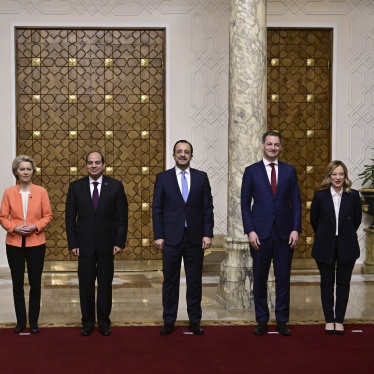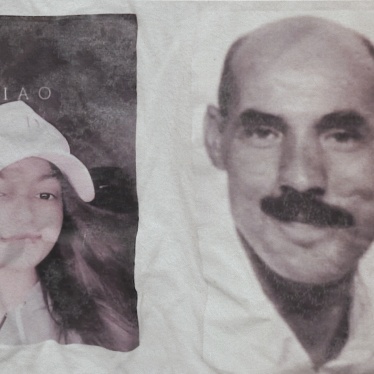I am writing to you and the other members of the Executive Council of the National Human Rights Organization about the cases of the thirteen political activists who were arrested in the kingdom on March 16, 2004. Human Rights Watch is deeply concerned about the reported circumstances under which the majority of them were released later that month, and the continued imprisonment of three of them: Ali al-Doumani, Dr. Matrouk al-Faleh, and Dr. Abdullah al-Hamed.
I am writing to you and the other members of the Executive Council of the National Human Rights Organization about the cases of the thirteen political activists who were arrested in the kingdom on March 16, 2004. Human Rights Watch is deeply concerned about the reported circumstances under which the majority of them were released later that month, and the continued imprisonment of three of them: Ali al-Doumani, Dr. Matrouk al-Faleh, and Dr. Abdullah al-Hamed.
Following the arrests, over 100 Saudi citizens signed a statement of solidarity with the men. As you may recall, this statement, dated March 21, 2004, termed the arrests “a disservice to the march of reforms in the country,” and “extremely discouraging as they come at the time when the government announced the establishment of the National Human Rights Organization which began its activities by attending the U.N Commission for Human Rights in Geneva.” The signatories described the men as “prisoners of conscience,” and called for their immediate release.
There are indications that restrictions may have been imposed on one of the activists, Mohamed Said Tayeb, a lawyer and former publisher. In an article published on April 30, 2004, in the Christian Science Monitor, a well-known U.S. daily newspaper, Mr. Tayeb was quoted as saying that he was “not at liberty to speak to the press.” The suggestion that Saudi authorities may have limited Mr. Tayeb’s fundamental right to freedom of expression should be of grave concern to all human rights activists, in Saudi Arabia and elsewhere.
It is also our understanding that Mr. Tayeb’s passport was confiscated after his release from detention in late March 2004, and that he cannot travel outside the kingdom. This is not the first reported case of the use of this arbitrary and punishing sanction against peaceful Saudi citizens. It would be most helpful if the National Human Rights Organization investigates and reports publicly about the use of travel bans, particularly in the case of Mr. Tayeb.
Human Rights Watch also hopes that you can provide us with specific information about the status of the legal proceedings against Ali al-Doumani, Dr. Matrouk al-Faleh, and Dr. Abdullah al-Hamed, including the specific charges against them. It was reported in the press, citing the official Saudi Press Agency who quoted an unnamed interior ministry official, that the men were being questioned for issuing statements “which do not serve national unity or the cohesion of society based on Islamic shari’a law.”
Last, I would like to reiterate the interest of Human Rights Watch in meeting you and your colleagues in the kingdom to discuss issues of common concern. After the National Human Rights Organization received its official government approval on March 9, 2004, you were quoted as saying that its main task “will be the protection of human rights,” and that “[t]he organization will cooperate with all internationally acknowledged human rights organizations and institutions”. In response, Kenneth Roth, the executive director of Human Rights Watch, wrote to you suggesting that you and your colleagues invite HRW to the kingdom, but never received a reply. We hope that you will again consider this request.
Thank you and your colleagues for your urgent attention to these important matters, and I look forward to hearing from you soon.
Sincerely,
Sarah Leah Whitson
Executive Director, Middle East and North Africa Division
CC:
Bandar Al-Hejar, Vice President
Ibrahim Al-Qaeed
Abubakar Baqader
Ahmad Bahkali,
Jowhara Al-Anqari,
Suhaila Hammad,
Abdul Khalek Abdul Hay
Lubna Al-Ansari.






